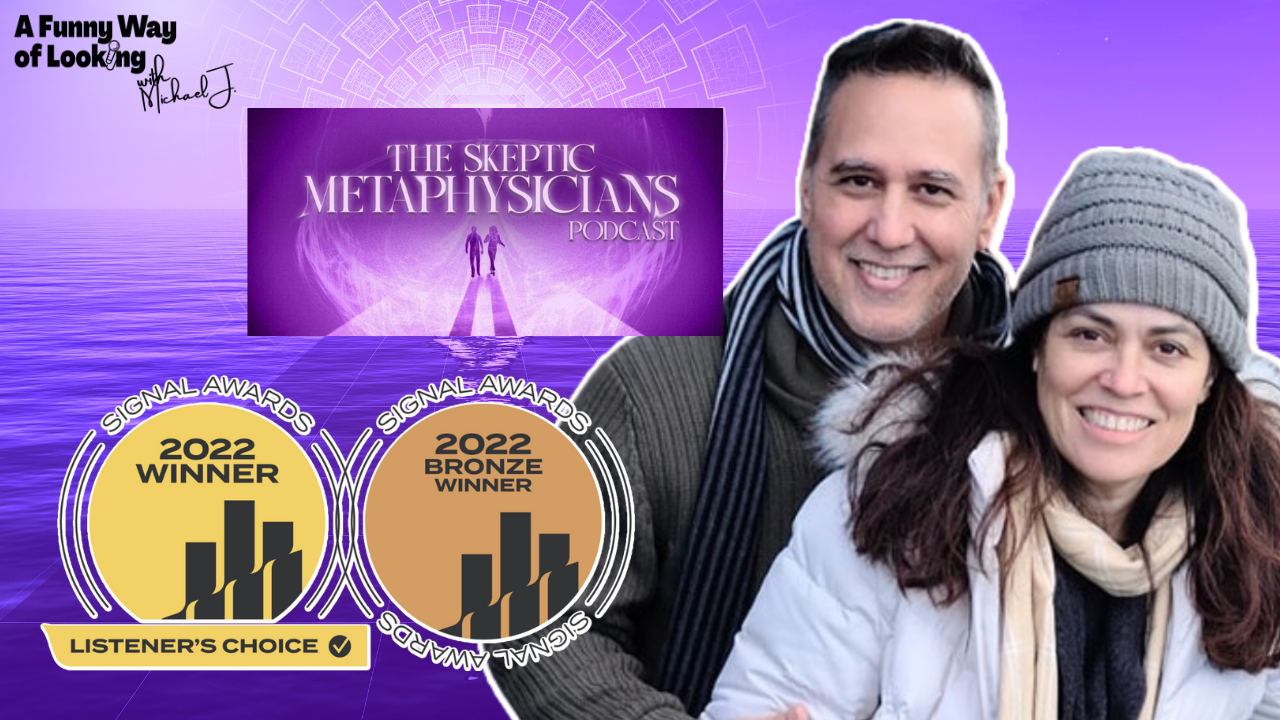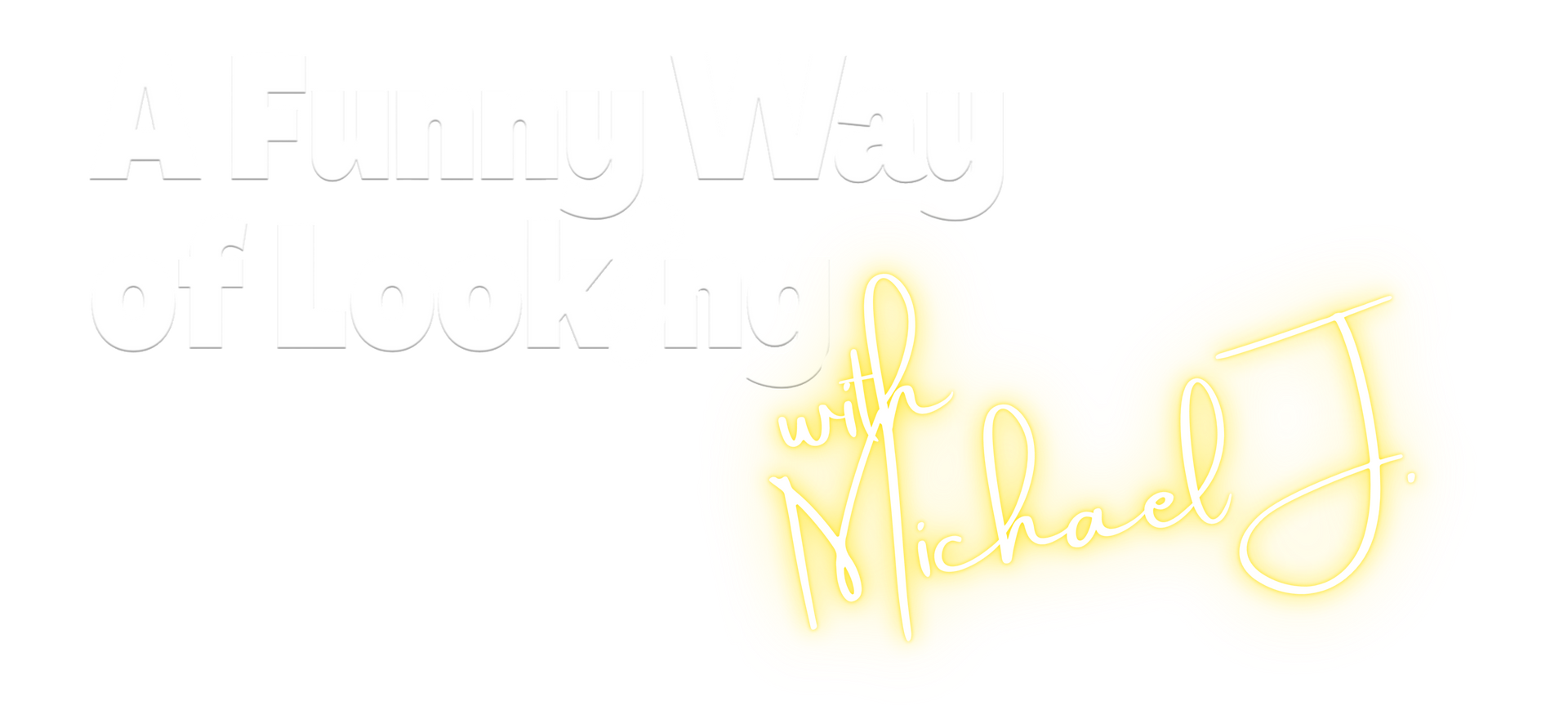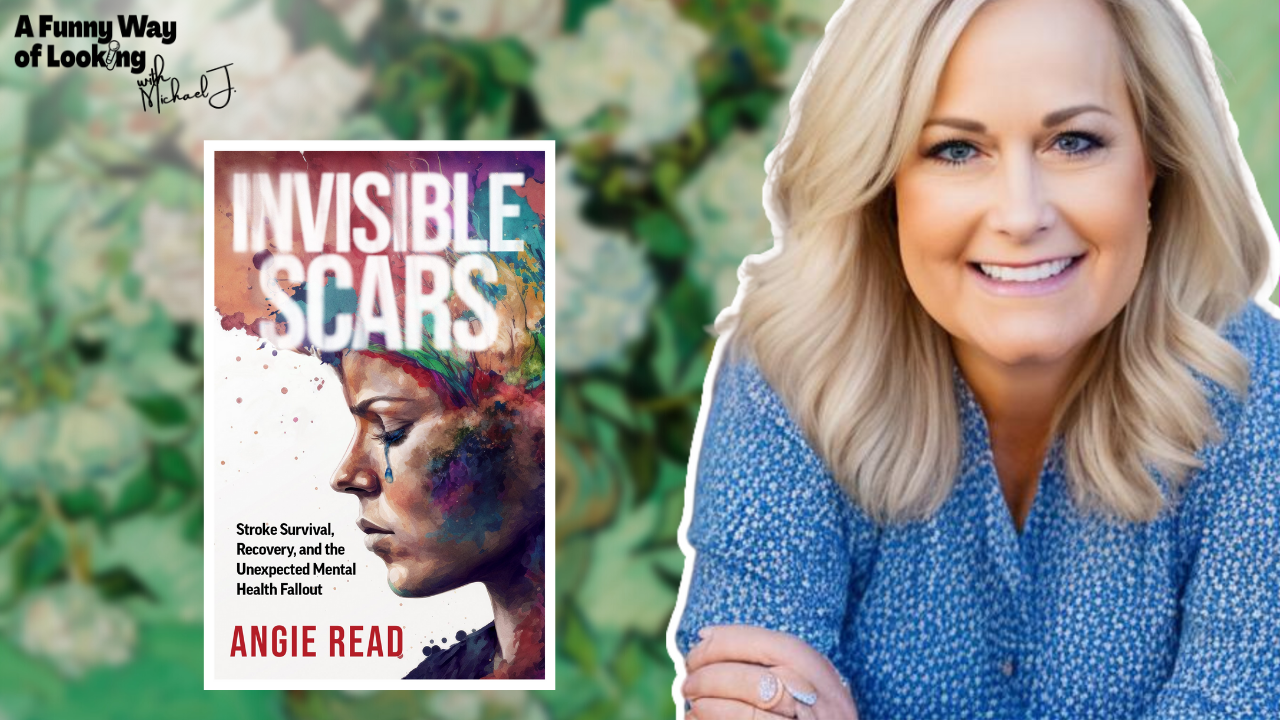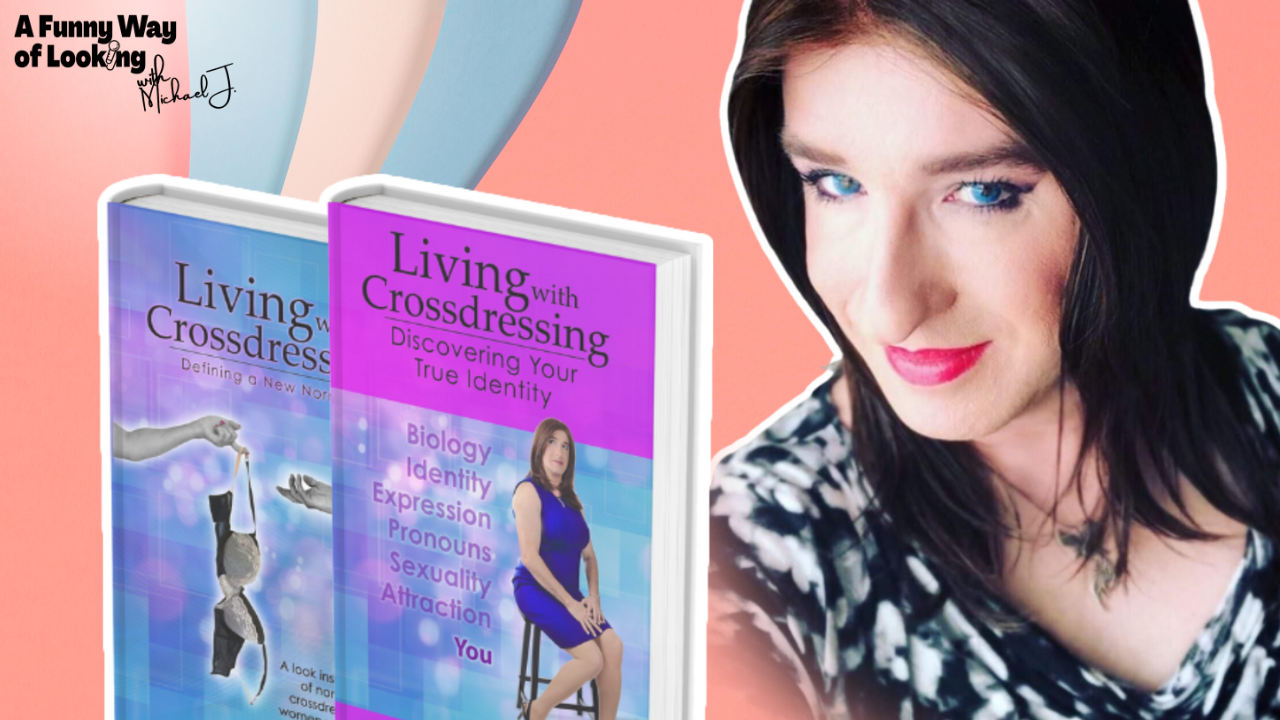Transforming Lives through Resilience, Spirituality, and Meditation: The Yvonne Zaher Story
Author of “Stories of the Heart & Soul of the Barrio,” Yvonne Zaher shares her story of growing up with a disability in a gang-infested barrio, and how she found the silver lining that inspired her to heal herself and others.
A Funny Way of Looking with Yvonne Zaher
MICHAEL J: Today, we have a guest whose story is a testament to the resilience of the human spirit and the transformative power of creativity and spirituality. Yvonne Garcia, who grew up in a gang-infested barrio, faced challenges that most of us can’t even begin to imagine. But, rather than becoming a product of her environment, she channeled her experiences into healing modalities, made a turn from Catholicism to spirituality, and created a compelling body of literary work. Her book series, short stories, and plays offer a glimpse into the world she came from and share important insights about her. Today, we’ll explore her imaginative realm, delve into her healing journey, discuss meditation, and discover so much more.
We’ll dive deep into the heart and soul of her story, connecting the dots between her life in the body and her spiritual and creative metamorphosis. Get ready to learn all about Yvonne today, ladies and gentlemen. Here we go!
MICHAEL J: Growing up in a gang-infested neighborhood. What does that mean? Tell us about it.
YVONNE: Well, it means that where you live is in the middle of a gang, and usually right across the tracks, there is literally a rival gang. So, what ultimately happens is that a lot of people get hurt throughout your life. By the time I was 20, I think 18 of my friends had been killed.
MICHAEL J: Were they in gangs themselves?
YVONNE: Mostly, sometimes it’s driven by accidents, but mostly, yeah, it shows that they take one person out on one side, and then the other ones take another one out on their side. It’s just awful. It’s awful. But, you know, I don’t know how to explain it. It’s like the world in a smaller realm. What’s happening in the world – people killing each other for territory, oil, or whatever they think they need –it’s the same thing.
MICHAEL J: When you’re growing up in that environment, though, how does it affect you? How do you feel every day? How do you relate to the world when, every once in a while, that’s the reality? I hate to put it that way, but you know this – someone’s going to die.
YVONNE: Yeah, yeah. It’s really hard. But what I have done in my life is I don’t judge the actions; people are people, you know. Just because you’re a president, a congressman, or whoever, you can order a hit or a kill, and that’s okay. But they’re still people, and in the end, the people that live there, they’re people too. So, when people think about gang members, they assume they’re horrible people and think all these things, but that’s not necessarily true. There are a lot of shades of gray with all actions.
MICHAEL J: I have to ask this. I had a guest on before, and his son was killed in violence. How do you deal with the people that, I assume at some point, you know, who killed who? Is there ever a point where you say,
“I forgive these people that did such things to me and my family”?
YVONNE: Yeah, I mean, you have to. I’ve had several people killed, and sometimes when you’re not balanced, you know, I’ll tell them a story that I probably shouldn’t, but I’ll say it. One time, some guys tried to kill my niece; she was only 16 at the time. They were angry at her because she was with their brother, and she broke his heart, or whatever the case may be. When I found out that they waited for her after work and shot at her like 20 times, I’m not gonna lie, my first instinct was,
“Oh, my God, we have to kill them all.” Instantly, that’s what I thought. The idea of getting a phone call saying that my favorite niece, my first niece, got killed was unacceptable to me. Just unacceptable. So that’s how it goes. But you have to catch yourself. You know, I said it. Yes, I take responsibility for saying it, but a day later, I was like,
“What are you saying?”
MICHAEL J: Yeah, it’s unfathomable to me. I guess I was lucky growing up in the suburbs, I suppose, instead of the
barrios.
YVONNE: It’s hard, and I had the unique experience of being friends with both sides because I lived in South San Gabriel and went to school in San Gabriel. So, I was friends with both sides. Whenever somebody from this side killed or hurt somebody from that side, it was doubly painful to me because most of the time, I knew who did it with that information.
MICHAEL J: What do you do with that?
YVONNE: When you’re young like that, nothing.
MICHAEL J: How do you reconcile that? In your mind, what do you say?
YVONNE: You know, there were always certain people who were doing those kinds of things, and I hated them. There were times that, boy, did I really wish that I could
“drop a dime.” But again, I had a brother, and I wasn’t going to put my family in that position. But it’s hard. It’s very hard.
MICHAEL J: Yeah, you have written a series of short stories about him. When did the light become okay for you to write those stories? And how much of the stories are real and actual versus things that you did to protect others?
YVONNE: Well, what made it okay was 40 years. I haven't written about anyone for 40 years. I mean, honestly, half the people are already dead. But I do change things around. I don’t write an exact account. It’s more like different elements put together in one story, and I change the names and make other alterations, you know, those kinds of things.
MICHAEL J: What do you want people to learn when reading the stories? Is it cathartic for you? Or, is it that you want other people who are in gangs now to learn something from reading your stories?
YVONNE: Well, all of that, but mostly what I want, and I don’t know why, is I want to bring to light that people are people. It’s not that they’re all horrible; there are some who are just like, in any country, you get people who like to torture others or who are happy that the people at the border are suffering, you know, there are those people. But the majority of people are not like that.
The majority of people have a heart and soul, and they do care. They don’t want to be like that. Maybe in a circle, like one of my stories called “The Hills,” it’s exactly that, it’s the circumstances. It talks about a young man who never wants to be in a gang, never does, but he’s put in a position where he has to kill someone. And then he gets jumped again after that. You know, what can you do?
MICHAEL J: Well, you talked about silver linings in your book. Just give us an example of one silver lining. To me, it’s not a silver lining when you’re forced to have to kill somebody so that you don’t die yourself. Maybe you can look at it that way. Give me an example.
YVONNE: Well, you know, for everybody, there’s a different silver lining, and you have to find that on your own. I can’t say for somebody that happened to my brother, who had a tragic life. I don’t know what his silver lining was. But in a play that I wrote, the prompt was,
“If you could talk to one person who has passed away, who would that be and what would the conversation be?” So, in my conversation with my brother, he gave me an answer regarding his silver lining. But that could have been my imagination. It didn’t feel like it was my imagination, but it could have been.
MICHAEL J: What’s your silver lining now?
YVONNE: That I write.
MICHAEL J: Okay. And do you do it now so you can continue to teach, continue to reach people? What is it now?
“
I started writing because I wasn’t done with life. I wasn’t done with teaching;
I wasn’t done with learning. So, that’s why writing is my silver lining.
YVONNE: Well, if I’m going to be very honest, you know, life gets busy with raising children, making money, acquiring things, buying a house, doing this, doing that. I never actually thought about writing until the universe stopped me. I can’t do anything else now. I’m disabled, and I started writing because I wasn’t done with life. I wasn’t done with teaching; I wasn’t done with learning. So, that’s why writing is my silver lining.
MICHAEL J: That’s awesome. I think, as we look at your story, you have your silver linings, you’ve got spirituality, you’ve got meditation. I want to know how you got from there. I don’t know if you were angry while you were living in the neighborhood or not. But, somehow you got from that place into a place of spirituality and meditation. How did that happen?
YVONNE: Well, again, it happened because of my brother. My brother was only 19 years old, and some stuff happened. He was going to go to prison for 20 years, and I loved my brother very much. People could look at my brother and say,
“Oh, that’s an awful person,” or
“He looks awful,” but my brother was the most kind-hearted, sweet person you could ever meet. I was very angry with God when that happened. I went to church to talk to the priest. I’m the kind of person who wants to know
“why” for everything, and nobody could give me a
“why”
answer. I literally went to every church you could think of – I went to the Mormons, I went to Islam, I went to the Oregon Christian, I went to Buddhism – and I wanted to find out why bad things happen to people who are considered bad? Because I never looked at my brother as bad. Did he do some bad things? Yes, he did. But was he a bad person? No, he wasn’t. So, I started reading.
MICHAEL J: How do you differentiate between bad things and bad people? How do you keep those separate?
“
Actions aren’t the person. There are a lot of people who do things that are shitty or bad, but it doesn’t mean they’re a bad person. It means that they made a bad choice or they were pushed into a bad choice. There’s a big difference between doing bad things because you like it and doing bad things because of your circumstances.
YVONNE: You keep them separate because actions aren’t the person. There are a lot of people who do things that are shitty or bad, but it doesn’t mean they’re a bad person. It means that they made a bad choice or they were pushed into a bad choice. There’s a big difference between doing bad things because you like it and doing bad things because of your circumstances. You know, I don’t look at people and think that they’re bad because of whatever; I just don’t. I don’t see that. I see that everybody has the divine within them, and it’s what they feed.
Are you going to feed the divine or are you going to feed the opposite? Because, you know, we’re all polar opposites. And I also believe – I do believe this, people can disagree with me all they want, but this is my belief – that whatever amount of ability you have to be good, you have the equal amount of ability to be bad. Case in point, I mean, normally, I’m pretty nice. I’m not really a bad person. But, when I thought that they were going to kill my niece, what was the first thing that came out of my mouth? “Oh, we have to kill them.” Yeah, you know what I’m saying. It’s crazy. It’s crazy.
MICHAEL J: How have the people that you know, who have killed other people that you love and care about, changed? Have you reconciled with them, where you’re able to speak with them now?
YVONNE: Oh, no, no, no, because most of the time when those things happen, and in the
barrios, you know, it’s a certain group of people who are always doing those things. I was not really friends with those people. I knew them, I knew of them, and yeah, I would see them at parties or whatnot, but they weren’t people I chose to be around. I mean, even at a young age, I’ve always been able to feel energy. I didn’t know what that was at the time. We’re talking way back in the 70s or early to late 70s, and people didn’t talk about energy or things like that. But, I had a great sense of energy, and there were just certain people that I would not be friends with, no matter what, even if they pursued me, I just wouldn’t.
MICHAEL J: Talk about energy because I want to get to the whole reconciliation. I want to talk about how you moved from wherever you were into where you are now with the meditations that you do.
YVONNE: It was after my brother got sentenced to prison, and I was very, very angry, very angry at God. I just thought it was all such nonsense, you know. So, I decided to go to the source. I started reading the Bible from cover to cover, and for some reason, I really focused on the words of Jesus. One of the words he says is,
“Ask, and you shall receive.”
And that phrase just kept playing over and over in my mind, along with,
“You can be as I am.”
For some reason, those two verses stuck with me.
So, every night when I went to bed, I would ask,
“Show me the way. What is the right way? I don’t believe that what I’ve believed all my life is right. Show me the right way.” Again, this was the 70s. After about a month of asking, and I know a lot of people are going to think this is unbelievable, but okay. After about a month of asking, I saw, before I fell asleep, in my mind’s eye, the word
“reincarnation.” I didn’t even know what it was back then, again, in the 70s. I was in a Chicano community, everybody’s Catholic, and nobody talked about stuff like that.
I thought I must have seen something or read something. It happened every night for two weeks; I would see that word. So, I went to the library and asked for a book on reincarnation. The lady looked at me very strangely and said,
“I don’t know if there’s one, but if there is, it would be over there.” I gave up.
I didn’t even know what I was looking for. It was like a movie. I turned around to walk away, and on the top shelf, I saw a book called “Reincarnation,” in block letters exactly like what I had been seeing in my mind: “The Phoenix Fire Mystery.” So, I took that book home and did not put it down until I finished it. It was a big book, and it made me cry because it made me feel somehow, I knew everything in that book. I knew what it was. It was like something I had forgotten deep down inside. I cried, and I cried, and I understood. I understood at that moment why things are the way they are.
Well, I started telling everybody. What did everybody say to me? My dad thought I sounded crazy.
“You’re upset because of your brother. What’s going on with you?” Nobody wanted to hear it. Again, it was the 70s. So, I shut my mouth, and I didn’t say anything for 30 years.
MICHAEL J: Wow. So, there’s a whole set of questions in my head. I want to start with: You were Catholic, and very Catholic. Do you now believe in Catholicism or spirituality?
YVONNE: Absolutely spirituality. I do not believe in Catholicism whatsoever.
MICHAEL J: Okay, so when you talk about spirituality, what is it that you believe now? And how does it help you through life and with your meditation and all this sort of thing.
YVONNE: I really feel that – I mean, this could be too long of a podcast if we really talked about it really – but I feel that a lot of people won’t understand it and might even get angry when I say this.
MICHAEL J: Go ahead. Let’s talk about it.
YVONNE: I believe that before we incarnate, we make contracts with people to experience things so that our soul can understand and really know what it feels like. So, in a sense, in that play with my brother, that’s what he tells me when I asked him,
“Brother, would you do everything differently?” And he says no because we all have our spiritual journey. Because of the things I did, my children are who they are. Because I did the things that I did, you are who you are, sister. So no, that was my role to play in this life, and I would not change one thing.
So basically, what I’m saying is that whatever happens is exactly perfect. It might not seem like it. Do I like the fact that I can’t walk anymore? Hardly. No, I don’t like it, and it’s sad to me. I’m not going to sit here and say that I’m all happy about it. Sometimes, I get really sad. But then I remind myself not to focus on that, focus on your children, who are healthy and thriving. Focus on your wonderful husband and wonderful friends. Focus on the fact that you have a mind where you can write and understand and help people understand. So that’s what I do, and I think everything is perfect, even when it doesn’t seem like it is. It does take strength to persevere.
MICHAEL J: How do you handle that mindset where things aren’t perfect, but they’re working out the way that they should work out? Is it through your meditation?
YVONNE: I wholeheartedly believe in meditation. You know, for 35 years, I thought I couldn’t meditate. I would try it through the years and give up because I didn’t have the money to spend $5,000 to go to a retreat or anything like that. Everything happened for me when I went spiritually up, up, up, and I kept it to myself. I didn’t fulfill everything, and it didn’t come to fruition until everything was taken from me when I couldn’t walk anymore. I was in utter pain all the time, and doctors had me on five medications.
One day, I lay there and said to myself,
“Is this it for me? I can’t walk, I’m in pain, and my mind’s not clear because I’m on five different opioid medications for the pain.” I asked God again, “Show me the way, somebody show me the way.” In my mind’s eye, I heard silence, and I thought,
“Silence, and I sit here, I need to meditate.”
Instead of sitting in a weird way or doing whatever people think they have to do to meditate, I just sat there in silence. Eventually, I was able to clear my mind, starting with little periods of time, just seconds, and then a minute, and then more. Because the mind is like a part of your body. If you want a six-pack, you wouldn’t go to the gym one time and decide,
“I’m not going to get a six-pack.”
It would take months and months to train your body, and that’s the way your mind is trained to silence.
MICHAEL J: What do you do to meditate? And then what do you teach people?
YVONNE: Well, I created, I shouldn’t say I created, but I put together a really simple method. I called it the 369 Meditation Method because, for me, it was hard to find what meditation worked for me at first. Now, I can meditate in any way. But before, I found that guided meditations were easier for people who didn’t know how to meditate. So, I do three minutes of guided meditation, three minutes of mantra or affirmation meditation, and then three minutes in silence, with nice music in the background. If you follow the 369 Meditation Method, you’ll have meditated for nine minutes.
Once you learn to meditate, you crave it because it feeds your soul. I liken it to when you are in silence; that’s where you touch God or the universe because all the answers are in the silence. Believe it or not, during meditation, many answers come to you. The trick is, if you don’t write them down and finish when you finish meditating, they’re gone. I don’t know why; I’m not the only one like that. A lot of people I’ve talked to are the same way.
MICHAEL J: I understand that, and I understand it in dreams also. In my daily thoughts, there are so many things going through my mind, but there’s always that one big
“bam,” and if I don’t write it down, it’s gone forever. I know. So, do you keep a journaling pad with you or a writing pad with you?
YVONNE: I do. I do. That’s when I decided to write the book that I just published. It actually came to me during a meditation,
“Stop writing what you’re writing and write a fantasy book.” I don’t even know why that happened. I thought,
“Well, I’m just going to write a celestial werewolf book,” but it turned out to be anything but that. There are a couple of scenes in there, but it turned out in the end, again, to be about energy. My supernatural book is turning out to be an energy book.
MICHAEL J: What do you want people who are listening to you now to come away with and think,
“Oh my god, I’m so glad I listened to Yvonne. I’m so glad I got this message.” What is that one message you want everyone who’s listening right now to understand?
YVONNE: That everybody can meditate. You think you can’t, but you can. You really, really can. The only thing you have to do, it’s the same thing that doctors, lawyers, and scientists do – be determined. Be determined to do it.
About Our Guest
Yvonne is an author and playwright, born in San Antonio, Texas and raised in the barrios of Southern California. Her first book The Council is available for pre-order. Find more about Yvonne and read her full bio here.
To watch more A Funny Way of Looking, visit our
Episodes page. If you enjoyed this article and want more epic content,
subscribe to our newsletter!



